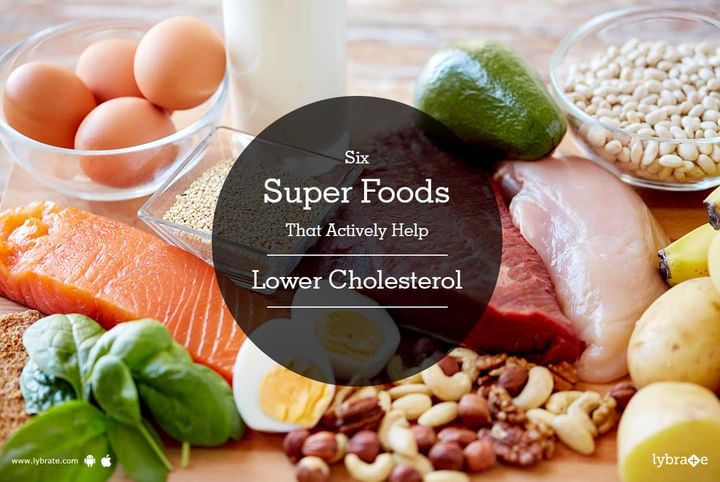Get the App
For Doctors
Login/Sign-up
Last Updated: Jan 10, 2023
BookMark
Report
6 Super Foods That Actively Help Lower Cholesterol
Dt. Krishna Dave VaidyaDietitian/Nutritionist • 10 Years Exp.M.Sc - Dietitics / Nutrition, Diploma in Naturopathy & Yogic Science (DNYS)
Some foods punch well above their weight in helping to reduce cholesterol levels, we call them 'Cholesterol busters'. Choosing a healthy diet, low in saturated fat is important in helping to keep your cholesterol low but you can reduce your cholesterol levels further by including these super six foods in your everyday diet
- Soya Foods: Being naturally low in saturated fat, soya foods help lower cholesterol. The special proteins in soya also appear to influence how the body regulates cholesterol too. Studies show you can lower your cholesterol by around 6% by including as little as 15g soya protein per day. Choose from: soya alternatives to milk and yogurt, soya desserts, soya meat alternatives, soya nuts, edamame beans and tofu.
- Nuts: All nuts are rich in vegetable protein, fibre, heart healthy unsaturated fats, vitamin E, magnesium, potassium, natural plant sterols and a host of beneficial plant nutrients. 30-35g a day of nuts (a handful) has the potential to lower cholesterol by an average of 5%.
- Oats and Barley: Both oats and barley are rich in a form of soluble fibre called beta glucan. Once eaten beta glucan forms a gel which helps bind cholesterol in the intestines and prevent it from being absorbed. It is recommended that we eat about 3g of beta glucan per day. Foods which contain 1g or more of beta glucan can carry a cholesterol lowering claim.
- Foods fortified with plant sterols and stanols: Plant sterols are structurally similar to cholesterol and can be divided into sterols and stanols. Their cholesterol lowering effects have been known for some time. Plant sterols/stanols are naturally found in a wide range of foods such as vegetable oils, nuts, seeds, whole grains, fruits and vegetables. However, for most people, it is not possible to achieve the optimum intake from ordinary foods.
- Fruits and vegetables: All fruits and vegetables are low in saturated fat so eating more helps to keep saturated fat intake low. Fruit and vegetables are also a valuable source of cholesterol lowering soluble fibres. Try to include at least one pulse (beans, peas, lentils) everyday. Other rich sources of soluble fibre include sweet potato, aubergene, okra (ladies finger), broccoli, apples, strawberry and prunes.
- Foods rich in unsaturated fats: Keeping our daily saturated fat intake below 20g (women) and 30g (men) is vital for cholesterol lowering, but it is equally important to replace this saturated fat with modest amounts of unsaturated fats such as those found in olive, sunflower, corn, rapeseed and other vegetable, nut and seed oils. Other foods rich in unsaturated fats include vegetable spreads, avocado, oily fish and nuts. Avoid coconut and palm oil as, unlike other these vegetable oils, they are rich in saturated fats.



+1.svg)
